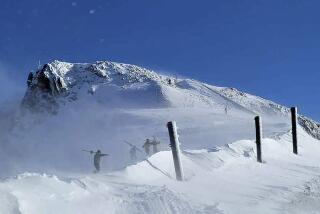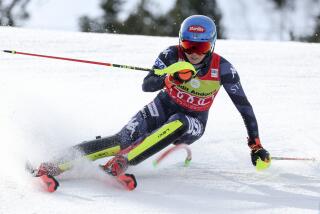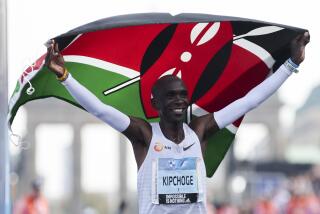Bode Miller poised to make ‘epic’ final run in men’s downhill
SOCHI, Russia — Bode Miller hasn’t won a World Cup race since December 2011, the Beaver Creek downhill in Colorado.
He is 36 years old and coming off micro-fracture knee surgery that forced him to miss all of last season.
He was born in the 1970s, is married and the father of two.
Yet, there is overwhelming evidence to suggest old man racer is the man to beat in Sunday’s men’s Olympic downhill.
FRAMEWORK: View the best images from the Sochi Olympics
“It’s his race to lose,” teammate Marco Sullivan said Saturday.
Miller has been so dominant in advance of the marquee Alpine event, winning two of the three training runs, he may have already spooked the competition.
Norway’s Kjetil Jansrud walked away after Miller’s final training run saying, “There’s not much to say besides it was epic.”
Miller’s confidence has ski-rocketed since he left Kitzbuehel, Austria, two weeks ago thinking he should have won the famed Hahnenkamm downhill (a costly mistake put him in third).
Miller is not even feigning humility in Russia.
“The idea is to be unbeatable,” Miller said after Saturday’s final test run. “You know, race day is always different. It’s going to be hard to stay calm … but yeah, I’m going to be ready. I want to win.”
This is a distant cry from ethereal Bode at the 2006 Turin Olympics, when he excoriated those who put too much emphasis on winning. Searching for the perfect run, like surfers seek the perfect ride, Miller bombed out in five races and left without a medal.
Four years later in Vancouver, Miller exorcised what haunted him in the Italian Alps and won gold, silver and bronze.
Miller’s motivation in Sochi is clearly his legacy. He knows this is his last Olympics and that his biological ski clock is ticking.
The course at Rosa Khutor was designed by 1972 Olympic downhill champion Bernhard Russi, but it might as well have been created by Bode Miller.
The track is similar to Beaver Creek and seems to fit Miller like a ski glove. It is fast, daring and daunting.
Miller ripped down Rosa on Saturday with a time of 2 minutes 6.09 seconds, more than a half second better than the field, and he was basically on cruise control.
Miller had already settled on his Sunday line and was just tinkering with his final game plan. That meant cleaning up his fourth interval approaching Bear’s brow, in which he finished 40th on Friday. He fixed the problem, finishing 10th in the section, and then stood up to purposely “dump” speed as he breezed home.
The chorus building for Miller is brazen in the respect victory would make him the oldest winner of an Alpine event, men or women, in Olympic history. Norway’s Kjetil Andre Aamodt was 34 in 2006 when he won the Olympic super-G in Turin.
One more Olympic medal would also give Miller six and move him alone in second behind Aamodt’s eight.
The only thing working against Miller is history. The Olympic downhill is noted for favorites not prevailing.
At Nagano in 1998, Austria’s Hermann Maier was a sure bet to win the downhill. His spectacular crash, though, the one where he said he looked up and saw “Lufthansa,” allowed France’s Jean-Luc Cretier to win his first race … ever.
The fluky, circumstantial, weather-related, one-hit wonderfulness of the Olympics allowed American Bill Johnson to win Sarajevo (1984) and Tommy Moe to win in Lillehammer (1994).
In 2006, out of nowhere, from the impossible 30th start position, France’s Antoine Deneriaz won the gold.
Longshots like Sullivan, the American veteran in his fourth Olympics, are trying to be Deneriaz.
.
“No one knows that name,” Sullivan said, “but he’s got Olympic gold.”
Miller also has to fend off legitimate, hard-core contenders like Norway’s Aksel Lund Svindal, who won downhill silver ahead of Miller’s bronze in 2010.
Svindal on Saturday also dubbed Miller the favorite but, like most Norwegians, he might just be nice.
Switzerland’s Carlo Janka will also be in the mix but said the distance between him and Miller is “a whole world.”
You know the Austrians will be up all night trying to find a way to foil Miller’s destiny.
The Austrians have won a record 105 Olympic Alpine medals and 19 gold, but have not produced the downhill champion since Fritz Strobl in 2002.
The Austrian men were embarrassed four years ago when they failed to medal in Vancouver.
“For us it’s forgotten,” Hans Pum, sports director for the Austrian Ski Federation, recently told Reuters. “For some press people, not.”
The Austrians are without Hannes Reichelt, one of their big guns, who had back surgery after winning Kitzbuehel.
The country will still send four tough challengers to the start gate led by Matthias Mayer, who won Friday’s training run.
The stage seems set, though, for something biting and epic.
“This course has teeth everywhere,” Miller said.
chris.dufresne@latimes.com
Twitter: @dufresnelatimes
More to Read
Go beyond the scoreboard
Get the latest on L.A.'s teams in the daily Sports Report newsletter.
You may occasionally receive promotional content from the Los Angeles Times.







